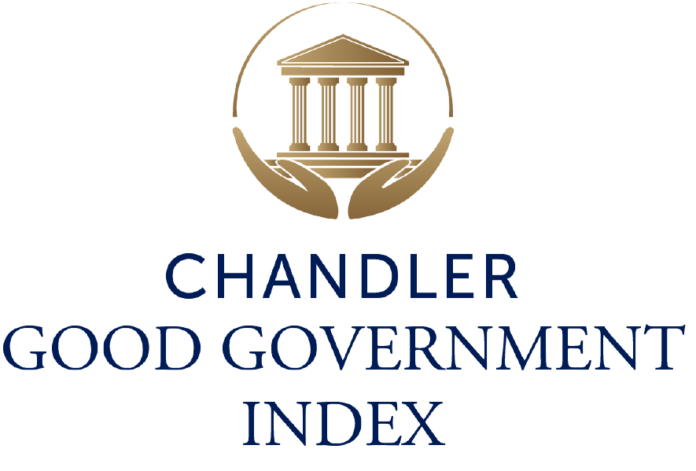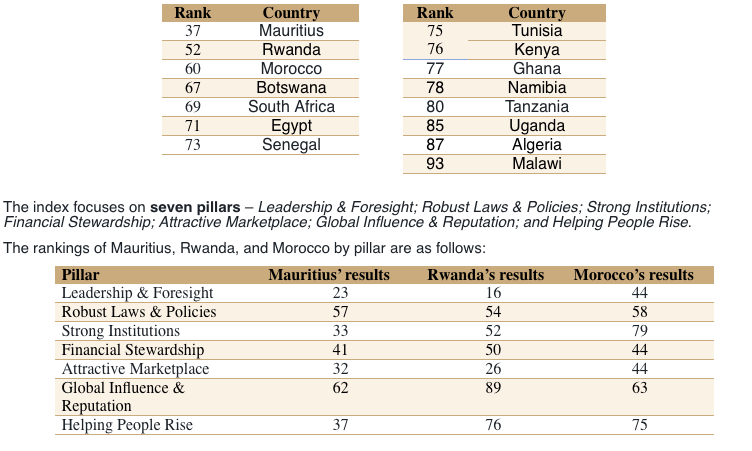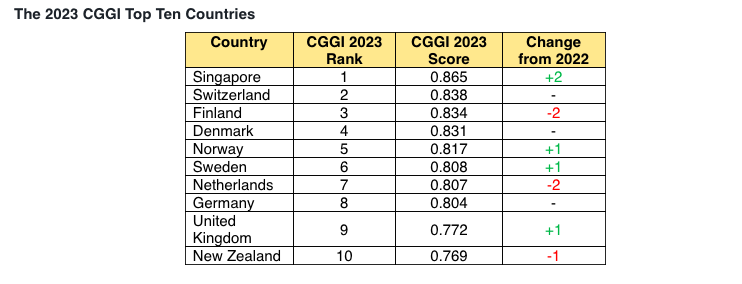- Taking the first, second and third positions among African nations are Mauritius, Rwanda and Morocco respectively;
- Globally, Mauritius ranks 37th (up one spot), with Rwanda 52nd (up three spots) and Morocco 60th (up four spots);
- Rwanda is the highest-ranking low-income country across the whole Index;
- The 2023 Index saw positive overall momentum for some other African countries, including South Africa (up one spot to 69th), Egypt (up two spots to 71st), Kenya (up six spots to 76th), Tanzania (up three spots to 80th) and Algeria (up one spot to 87th).
26 April 2023 – The Chandler Institute of Governance has today published its third annual Chandler Good Government Index (CGGI) report and country rankings. Drawing on data from 35 indicators across seven governance pillars, this year’s CGGI provides a snapshot of government capability in 104 countries (covering 90% of the world’s population) and serves as a comprehensive analytical tool to improve government performance through clear, actionable data.
In a challenging global context, the 2023 CGGI rankings see momentum in good governance and upward movement from countries in Africa, including Kenya, Ethiopia, and Rwanda. The countries topping the Africa league table this year are Mauritius (37th), Rwanda (52nd), and Morocco (60th).
Across Africa, the top 15 countries ranked in the CGGI are:
This year’s Chandler Good Government Index explores why good governance is even more critical today as governments navigate the ‘polycrisis’. It looks in-depth at the reform journey of Mauritius to date. Mauritius has risen an impressive nine spots in the Helping People Risepillar which measures outcomes for citizens, such as health, education, and social mobility.The Honourable Teeruthraj Hurdoyal, Minister of Public Service, Administrative and Institutional Reforms of Mauritius shared with CIG how, “measures such as the minimum wage, a negative income tax and a portable retirement gratuity scheme help improve the quality of life for those at the lowest rung of the ladder.”
The report also features Rwanda, which has soared 11 spots in the Strong Institutions pillar which measures how government ministries and agencies work together to coordinate and implement policies. Dr Usta Kaitesi, CEO of the Rwanda Governance Board shared how measuring the quality of governance allows its government to hold itself accountable: “There is an intentional leadership approach that instils a culture of holding ourselves accountable. When you determine to hold yourselves accountable, under any institution, you create systems that are going to be fair in the process of holding one another accountable.”
Tanzania’s impressive economic growth rate and Senegal’s efforts to build a more resilient health system were also highlighted in the report.
The 2023 Index rankings have produced some significant movements that reinforce emerging global trends. Most strikingly, Singapore has emerged as the strongest performer in the rankings, unseating Finland from its 2-year lead in the Index and leapfrogging Switzerland in the process. After Singapore, Northern European nations dominate the top end of the Index with New Zealand taking the final spot in the top ten. Other noteworthy movers in this year’s rankings were the United States (up four places to 14th); the United Arab Emirates (up four places to 20th); and Vietnam (up seven places to 49th).
Key Insights from the 2023 CGGI:
- A number of Asian countries have made gains in the ranking, demonstrating improved public sector capabilities and performance. Asian climbers include Singapore, Japan, Vietnam, Indonesia, China, Cambodia, and South Korea.
- Middle-income countries have experienced the greatest movement in the rankings. Some of the biggest improvers in 2023 are Vietnam, North Macedonia, the Kyrgyz Republic, and Kenya.
- The most reliable predictors of overall good governance are the CGGI indicators capturing the Rule of Law, Ethical Leadership, and Property Rights. This was also true for our 2022 and 2021 data, illustrating how fundamental these three components of government are to delivering effective governance.
- Good government is closely correlated with several important outcomes, that are national goals and priorities for many countries:
- CGGI scores were strongly correlated with reducing extreme inequality. This suggests that well-governed countries are better prepared to achieve shared prosperity, and fairer and more inclusive societies.
- CGGI scores were strongly correlated with effective response and adaptation to crises, as measured by the INFORM Risk Index. Singapore, Finland, and Norway show the strongest capacity to manage risks posed by the polycrisis.
- Correlation between CGGI scores and the Fragile States Index shows that well-governed countries are more likely to have developed greater resilience to prepare for a polycrisis. This relationship is true regardless of their level income level, population size, or geographic position.
WU Wei Neng, Executive Director of CIG, said:
“We designed the Chandler Good Government Index to inspire and inform national leaders around the world in our shared quest to deliver better government, and with it, better outcomes for citizens and businesses. Our Index methodology focuses on technocratic capabilities and skills, rather than political ideologies. We want the CGGI to be a practical tool to support more effective governance and public service delivery for all countries, regardless of their system of government or income level. It is encouraging to see positive movement in the rankings amongst middle-income countries, and a number of countries in Asia. In this context, the CGGI can support a globally inclusive conversation on what good governance is and how to achieve it, with a range of perspectives from around the world. Such conversations are timely at this critical juncture.”
Christian BASON, Chief Executive Officer of the Danish Design Centre and Member of the CGGI Global Advisory Panel:
“One of the most striking findings of this year’s CGGI is the enduring key role of ethical leadership. It points to the responsibility of public decision-makers of all walks to uphold high standards of integrity and empathise with the citizens and societies they work for. It ultimately concerns whether you serve yourself, or you serve the people that have vested you with power. Ethical leadership should however also be seen in the wider context of leadership and foresight. Perhaps most important at a time of polycrisis is the ability to collaboratively foster new visions of what a good society looks like. After all, if you can imagine it, then you can design it.”
About the Chandler Good Government Index: The CGGI measures the governance capabilities and public sector effectiveness of 104 countries – approximately 90% of the world’s population. The CGGI framework has been developed through extensive research, drawing on interviews with practitioners and experts on what capabilities and characteristics are most important for a government to perform well and deliver good outcomes for citizensand businesses. The 35 indicators are made up of more than 50 metrics – of which almost 40% are quantitative data sources. Importantly, the CGGI is constructed with a non-partisan and non-ideological worldview, and focuses on operational factors, planning capabilities, strategic foresight, and governance outcomes. This makes the Index results more relevant to a wider range of countries, regardless of their income level, political system, and culture.
About the Chandler Institute of Governance: CIG is an international non-profit organisation, headquartered in Singapore. CIG is a partner to governments, supporting them in building strong nations for the next generation through training programmes, technical projects and partnerships, and knowledge creation and sharing.
A full copy of the report is available to view here.


































































